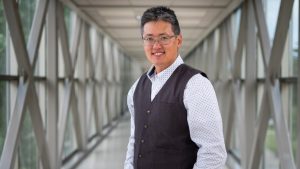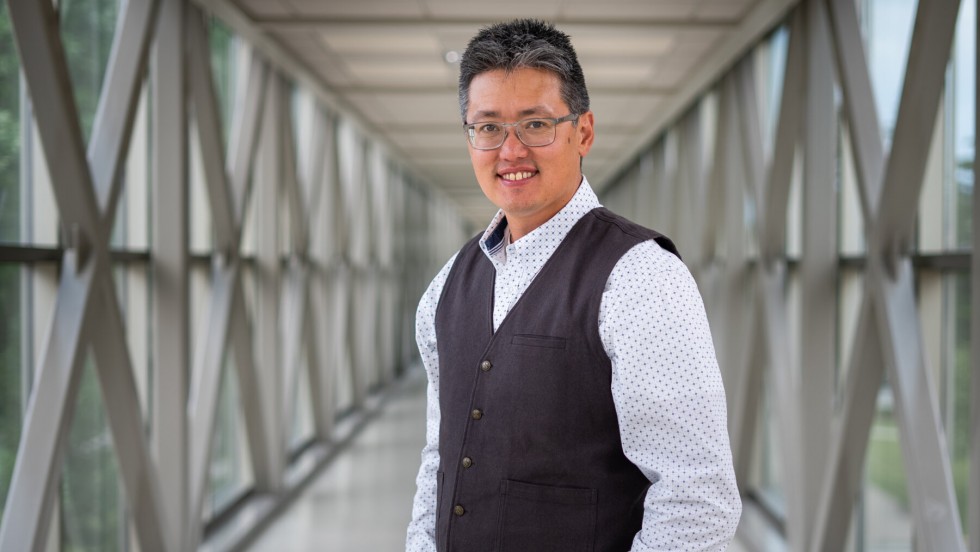With a laugh that fills the room and a wide-brimmed black cowboy hat atop his head, Michael Chan is sure to make an impression on those who meet him, but for many, Chan is still a fresh face around Concordia’s campus.
Chan is the first-ever Executive Director of Faith and Learning at Concordia. The position is unique in the fact that it combines four Concordia programs which up until now had been synchronous yet distinct.
“Because all of those actions and commitments of the college have been put together in this one position, they will by necessity be more cohesive and more intentionally strategic than they ever have before,” said Deacon Jon Leiseth.
Firstly, Chan is responsible for overseeing the Lorentzen Center for Faith and Work. The Lorentzen Center was established in 2012 on the groundwork left behind by the Center for Ethical Leadership and is seeking to further its mission by answering a leading question.
“I’m delighted to join you in lifting up the work of Dr. Michael Chan, our new Executive Director for Faith and Work,” said President William Craft. “Michael has been at work throughout the summer, planning the focus of the center, which is on building a more trustworthy world.”
“We’re asking the question ‘how do we build a more trustworthy world?’” said Chan. “And we’re trying to get that question by thinking about different democratic institutions and practices which in the current moment seem both critical and fragile.”
To many, this seems an apt theme.
“I think the theme is incredibly timely,” said Leiseth. “Simply in terms of my own experience, I don’t know that I have many days where the presence of trust and distrust, whether in public institutions or simply in day-to-day interactions, doesn’t seem incredibly high.”
Chan cites reform in the economic system, legal system, faith communities and journalism as several of these integral systems which require rebuilding of trust within the public eye.
To help answer this question of trust, The Lorentzen center is looking to bring in keynote speakers.
“We have just a remarkable line-up of speakers this year,” said Chan. “Our first speaker spoke on August 31. His name was Yuval Levin, a former domestic policy advisor under then President George W. Bush. He’s done a lot of work on institution building. He wrote a book called A Time to Build, and that’s inspired a lot of what we’re doing this year.”
The Lorentzen Center is seeking to draw student engagement through partnership with specific professors and student organizations whose individual missions pertain to the messages of the various keynote speakers.
In addition to the talks provided by these speakers, the Lorentzen center is seeking to further their mission of building trust and community through newsletters and a new podcast entitled “Builders: A Podcast of the Lorentzen Center.”
“We bring in people who have built a business or an organization and we ask them about that process and how it connects to their own sense of calling or vocation,” said Chan. “Then we ask them what lessons they have learned during that building process.”
As well as his work within the Lorentzen Center, Chan also oversees the Dovre Center for Faith and Learning.

“The Dovre Center really is focused on vocational discernment for faculty and staff,” said Chan. “One of my priorities there is to expand its reach to students as well.”
The last two areas of responsibility for Chan include overseeing the Campus Ministry program as well as the Interfaith program. Collaborating with professor Anne Mocko, as well as a team of faculty, staff and students, Chan is taking a close look at Concordia’s Interfaith Statement.
“Concordia’s Interfaith program is really remarkable,” said Chan, beginning to quote the Concordia Interfaith Statement. “Concordia College practices interfaith cooperation because of its Lutheran dedication to prepare thoughtful and informed global citizens who foster wholeness and hope, build peace through understanding, and serve the world together.”
The goal of the team is to view the 2022-2023 school period as a “visioning year,” in which the Interfaith Statement is examined to see where it is flourishing on campus and where it may be neglected.
“When that vision process got dreamed up over the summer, it was hard because students weren’t really around,” said Chan. “And now I’m starting to hear more of the stories. Both stories celebrating how Concordia has welcomed people in, and stories when that hasn’t been the case. So that’s been mainly what this process has been for me is taking stock and hearing from people who are living here at Concordia that don’t come from its traditional Lutheran heritage.”
Out of several different reasons, Chan cites this commitment to approaching topical questions from a variety of faith perspectives as being a key factor which drew him towards Concordia. He also stressed the importance of Concordia’s student body in his decision to make the move.
“The student experience is really important to me,” said Chan. “If any student sees their passions reflected in any of these projects, even if it’s a rant or a complaint, I would just issue the invitation – say hi, I want to hear from you for sure.”
The next Lorentzen keynote speaker will be Kathryn Finney, in partnership with Concordia’s Black Student Union on January 25. More information can be found on the Concordia College webpage.

